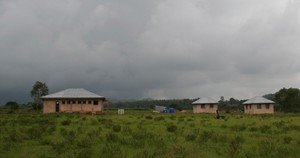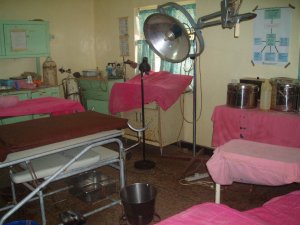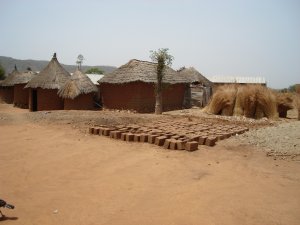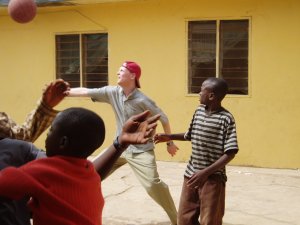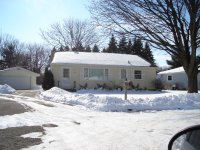Dear friends,
It is hard to write in a succinct fashion everything that has happened
in the past week since we've left for Africa, but we'll try some
highlights for now and expand later on, as we've got six more weeks to
talk about what's been going on here!
First of all, thank you so much for all your prayers. Our flight from
Charlotte to Newark to Amsterdam to Abuja (25 hours in total!) was
totally uneventful. Everything was on time, and our baggage, which we
worried about a lot, was totally fine. We were esp worried at Abuja
that they would search our bags and we'd have to explain the medical
equipment, computers, books, etc, that we were bringing for Evangel
hospital (where I am working), but as soon as they heard we were with
SIM/ECWA (Serving in Missions, the group we are with, and Evangelical
Church of Western Africa, their native sister organization) they let us
go quite easily. Praise the Lord!
The first night, when we arrived last Wednesday, we were in Abuja, the
capital of Nigeria. It was hot, humid, and the electricity went out
three times during the night---it made it hard to sleep! SIM has a few
private drivers and cars, so they had sent a driver and a car to pick us up in Abuja. We stuffed the back of the station wagon to the brim with luggage (no looking out the back window!) and drove the 3 hours to Jos on Thursday morning. On the way to Jos, we passed many roadside markets selling fresh carrots, tomatoes, cabbage, and yams, which are a potato-like staple here in Nigeria. People were stopping their cars and talking to people on the roads constantly, everywhere. Even though it was the middle of the morning, people all seemed to be wandering around outside. No one seemed to work inside, and indeed we find that is true, few people have “office” jobs here. We learn that the people, congestion, and market areas are very common all over. Roads are very scary, as no one seems to obey traffic laws and there are many, many motorbikes which are driven very, very dangerously. Along the way, we passed several military checkpoints, which are there to deter armed robbery along the highways, and we passed out small Bibles we had brought to some of them. They love books in Nigeria, as they are very expensive, and the military men look quite bored often, so something to read is great for them. I really hope they read them earnestly!
The countryside is quite dry and scrubby, but it is amazing what will grow even in the dry season. For some reason, the weather has been strange and it had been raining when it shouldn’t have been, and unseasonable hot a month ago, and unseasonable cool now. But still, we saw lots of big mango and lemon trees, very brightly flowering trees with flowers of all colors, my favorite are the orange-peachy ones. There was lots of open land. It appears it is true that the Nigerians do not really value their agricultural abilities, and much land that looked like it was once farmed is now empty. We did pass many yam fields---big, root-like tuberous starched much like potatoes. It is a staple of the country and they eat them either boiled and deep fried, or pounded into a soft, doughy, more bland style. There were many little goats roaming around and gaunt cows with big horns, wild dogs, wild cats, and kids everywhere.
So, we arrived in Jos, which is cooler than most of Nigeria because it is high above sea level. Evangel compound, where we are staying, is actually behind Evangel hospital, which is itself quite a few buildings. There are guards at the hospital gates, and then when we reached the living quarters, which is a fair way past the hospital buildings, we reached another set of gates, also guarded day and night. There are about 30 families who live on the compound, about 10 white families and the rest Nigerians. The houses are surprising spacious and comfortable. Our apartment has fours rooms, a tiny kitchen, bathroom, bedroom, and living/dining room. It is next door to another apartment with two other STA’s (short term assigments) who are medical students from Ireland and Britain (Maryon and Becca), and also by the watch dogs’ kennel (who I can hear barking all night long). It would have been quite clean, except with the Harmattan, EVERYTHING was covered in dust.
How shall I describe the Harmattan? Basically, sand storms in the Sahara end up blowing dust all the way across sub-Saharan Africa, and it ends up looking like a lot of smog/fog. It’s terrible---it gets on everything and doesn’t come off. You can clean a surface, and a few hours later it looks like you didn’t clean at all. By the end of the day, if you’ve been outside at all, your hair is grey, your feet and hands are dusty, your eyes are burning, and it’s just gross. The only nice thing about it is that it only happens when it’s not too hot, so in Jos, it has been quite nice---probably only in the low-mid 80’s and it’s not humid at all, so it actually feels quite cool in the shade and at night.
We spent the first 5 days getting adjusted---meeting families in the compound and the other SIM/ECWA workers, learning to shop at the market (more about that later!), learning to bleach our food, boil and filter water, learn to take a taxi, tour the SIM headquarters, etc. We started officially working this Monday. Yesterday, I started out at morning report at the hospital, where the doctors grill the residents on what happened to the patients the day before. I'll have more on the medical work later. The hospital is a big compound of many interlocking buildings. It is a combination of general wards, which are big rooms with many people in it, semi-private and private rooms, depending on their money. In Nigeria the care of the patient often rests on their families instead of the nurses, so there are people lounging around everywhere. The only room that has air conditioning or a fan is the X-Ray room. There are about 5 white doctors and I can't tell how many Nigerian doctors and about 5-6 residents. There are no medical students except Maryon, Becca, and I.
However, I actually started working at Spring of Life, which is their AIDS counseling clinic. They do not do the “medical” things, but instead do home visits, pre and post testing counseling, HIV testing, and decide if people need to go to the doctor. I go on home visits with people from the clinic to check up on patients, and also have started doing some HIV testing. It is actually quite easy technically, BUT. During that time, I thought with a lot of amusement how Nigerians would laugh their heads off at the patient privacy ideas that we hold so dear in America. Imagine what they’d do in the US if I tried to do a quick blood HIV test on someone with an audience of 30 other patients all giving words of advice and laughing at them when someone winced or if one of us messed up. Well, that is what happens in Nigeria. But like I said, more on medical stuff later!
One thing I have learned is to give an extra 10 minutes to allow for the guards trying to teach us Hausa! There are guards everywhere here, as unfortunately there can be armed robberies anywhere here, and I usually pass about 2-3 on my walk to the hospital. In Nigeria, when you greet someone, you greet them extensively. It goes something like this:
Good morning!
Thank you, good morning.
How is your tiredness?
There is no tiredness!
How is your work?
Thank God for our work.
How is your husband?
Good, thank you.
How is your family...
and so on, and on and on.
You can imagine that if we have to do this every time we meet someone, it takes a while to get anywhere! So the guards stop us and try to get us to do the proper greetings every time I pass. It is quite rude not to stop and do this greeting with people you know and pass, no matter where you are, and Nigerians don’t believe in hurrying, so you always have to stop, no matter how late you are. Nowadays, I have to also greet the gardeners, the men who dig the ditches, the laundress, the personal drivers, etc, etc, etc…who would have thought so many people would be out and about along the way to work??
